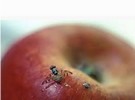A quarantine has been declared due to a Mediterranean fruit fly (Medfly) infestation detected in the unincorporated area of Devore, San Bernardino County. A total of 2 adult males, 2 mated females and multiple larvae have been detected to date. The United States Department of Agriculture (USDA), the San Bernardino County Agricultural Commissioner, and the California Department of Food and Agriculture (CDFA) are working collaboratively on this project. The quarantine area in San Bernardino County measures approximately 93 square miles, bordered on the north by Silverwood Lake; on the south by Muscoy and North Fontana; on the west by Lytle Creek; and on the east by Crestline. A link to the quarantine map may be found here.
The quarantine area in San Bernardino County measures approximately 93 square miles, bordered on the north by Silverwood Lake; on the south by Muscoy and North Fontana; on the west by Lytle Creek; and on the east by Crestline. A link to the quarantine map may be found here.
Sterile male Medflies are scheduled to be released in the area as part of the eradication effort. The release rate will be 500,000 males per square mile per week in a 16 square mile area around the infestation. In addition, properties within 200 meters of detections are being treated with an organic formulation of Spinosad, which originates from naturally-occurring bacteria, in order to remove any mated female Medflies and reduce the density of the population. Finally, fruit removal will occur within 100 meters of properties with larval detections and/or multiple-adult detections.
The sterile fly release program has a proven track record of success in California. Sterile male flies mate with fertile female flies in the natural environment but produce no offspring. The fly population decreases as the wild flies reach the end of their natural life span with no offspring to replace them, ultimately resulting in eradication of the pest. Sterile male Medflies are provided by the joint CDFA/USDA sterile insect rearing facility in Los Alamitos, which prepares sterile flies for release everyday over the Los Angeles basin. CDFA has successfully eradicated each and every detected Medfly infestation in California history, dating back more than 30 years.
The quarantine will affect any growers, wholesalers, and retailers of susceptible fruit in the area as well as local residents. Home gardeners are urged to consume homegrown produce on site and not move it from their property. These actions protect against the artificial spread of the infestation to nearby regions where it could affect California’s food supply and backyard gardens.
The Medfly is known to target more than 250 types of fruits and vegetables. Damage occurs when the female lays eggs inside the fruit. The eggs hatch into maggots and tunnel through the flesh of the fruit, making it unfit for consumption. Residents who believe their fruits and vegetables are infested with fruit fly larvae are encouraged to call the state’s toll-free Pest Hotline at 1-800-491-1899.
While fruit flies and other invasive species that threaten California’s crops and natural environment are sometimes detected in agricultural areas, the vast majority are found in urban and suburban communities. The most common pathway for these invasive species to enter our state is by “hitchhiking” in fruits and vegetables brought back illegally by travelers as they return from infested regions of the world. To help protect California’s agriculture and natural resources, CDFA urges travelers to follow the Don’t Pack a Pest program guidelines.
For more information:
California Department of Food and Agriculture
Tel: 916-654-0462
www.cdfa.ca.gov










